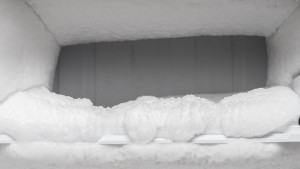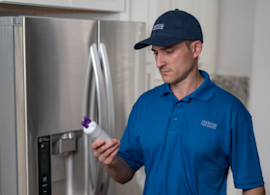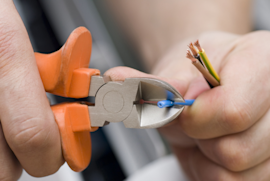- Kenmore refrigerator water filters
- Whirlpool refrigerator water filters
- Samsung refrigerator water filters
- GE refrigerator water filters
- LG refrigerator water filters
- Frigidaire refrigerator water filters
- KitchenAid refrigerator water filters
- Maytag refrigerator water filters
- Kenmore Elite refrigerator water filters
- Estate refrigerator water filters
- GE Profile refrigerator water filters
- Amana refrigerator water filters
- Bosch refrigerator water filters
- Dacor refrigerator water filters
- Electrolux refrigerator water filters
How to defrost a freestanding freezer


If your freestanding chest freezer or upright freezer has 1/4 to 1/2 inch of frost lining the inside walls, it's time to defrost. Otherwise, your freezer works less efficiently, and you give up real estate inside the freezer.
Start by moving the frozen food to ice chests to keep it cold and then unplug the freezer. Your next steps depend on the type of freestanding freezer you have and are explained below.
Once defrost is complete, clean interior surfaces using a solution of 2 tablespoons of baking soda dissolved in a quart of warm water. Then wipe the surfaces dry.
These defrost tips work for many brands of freezers including Kenmore, Frigidaire, Whirlpool, GE and Amana freezers.
For troubleshooting tips and more how-to help, check out our DIY freezer repair page.
Defrosting freezers with a defrost drain
Upright and chest freezers with defrost drains can use a 1/2-inch garden hose adapter to drain directly into a floor drain.
Upright freezer
Remove the drain plug on the inside floor of freezer by pulling it straight out.
If the freezer has a base panel, remove it from the cabinet and find the drain tube near the left center under the freezer.
Place a shallow pan under the drain tube to catch water as it melts, checking the pan occasionally to avoid overflowing.
Replace the drain plug when defrosting is complete.
Chest freezer
Remove the exterior drain plug.
Place a shallow pan under the drain outlet.
Remove the drain plug inside the freezer.
As the pan fills, empty it so it doesn't overflow.
Replace both drain plugs when defrosting is complete.
Defrosting a freezer without a defrost drain
Place towels or newspaper at the bottom of the freezer to catch frost as it loosens and falls.
If the frost is soft, use a plastic scraper to gently scrape the frost loose.
If the frost is hard and glazed, place deep pans filled with hot water on the freezer floor, close the lid and let it sit for 15 minutes to allow the frost to soften. Repeat this step as necessary.
Most common symptoms to help you fix your freestanding freezers
Choose a symptom to see related freezer repairs.
Main causes: burned out light bulb, bad door or lid switch, faulty LED light board, wiring failure, control system failu…
Main causes: lack of power, bad compressor, refrigerant leak, bad thermistor, defrost system failure, dirty condenser co…
Main causes: compressor failure, no refrigerant, faulty sensor, control failure, broken defrost heater, bad defrost bi-m…
Main causes: damaged door or lid gasket, cracked cabinet liner, bad defrost bi-metal thermostat, broken defrost heater, …
Main causes: excessive frost, bad defrost heater, bad defrost bi-metal, control system failure, low refrigerant charge, …
Main causes: dirty condenser coils, condenser fan failure, dirty bottom front grill, leaky door or lid gasket…
Main causes: lack of power, control system failure, broken compressor start relay, locked up compressor, compressor moto…
Main causes: leaky door or lid gasket, broken defrost heater, bad defrost bi-metal thermostat, defrost control failure, …
Most common repair guides to help fix your freestanding freezers
Effective articles & videos to help repair your freestanding freezers
Use the advice and tips in these articles and videos to get the most out of your freezer.

Learn about all the convenient features on our Sears PartsDirect website that make your parts purchases easier.…

Get answers to frequently asked questions about Sears and Sears PartsDirect.…

Learn how to repair broken, frayed or damaged wires in your appliances.…